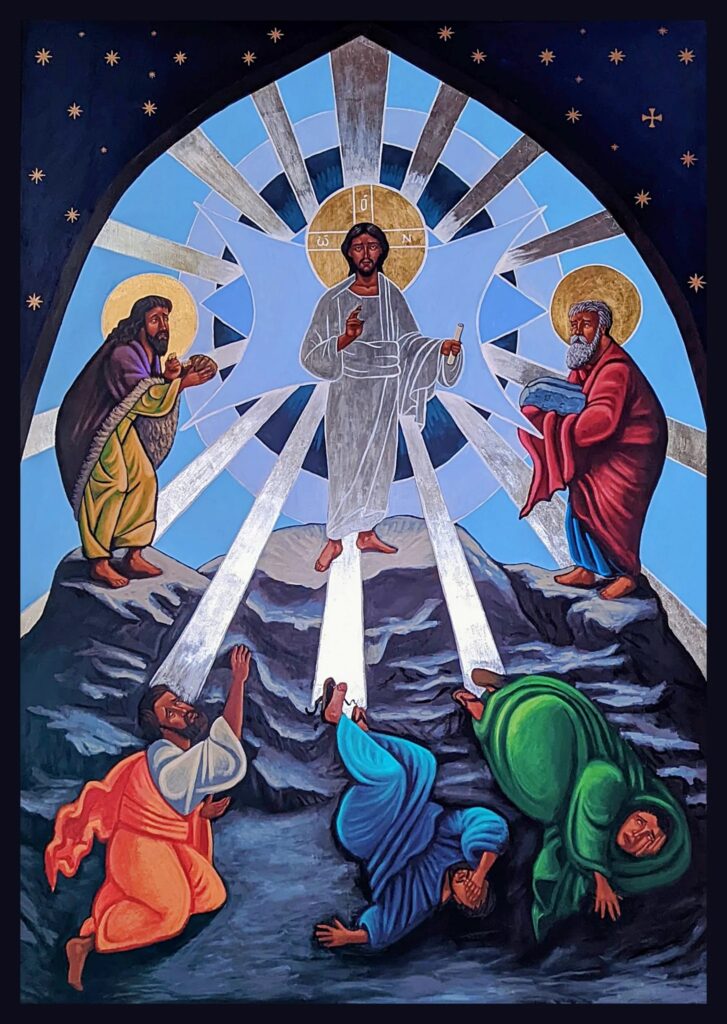by Judy Stack
It’s funny how one word can lead you on an entire journey.
This Sunday we will be hearing the traditional texts for the last Sunday of Epiphany-tide: the gospel story of Jesus’ Transfiguration and two texts related to Moses’ “transfiguration” (the story from Exodus and Paul’s Christ-centered reinterpretation of it in 2 Corinthians).

The word that started my journey was “unveiled.”
Paul says, “And all of us, with unveiled faces, seeing the glory of the Lord as though reflected in a mirror, are being transformed into the same image from one degree of glory to another.”
I wondered how and where else that word “unveiled” was used, particularly in the Septuagint, the Greek translation of the Old Testament that formed the fertile soil of Paul’s theological reflection. And what I found surprised me.
Primarily this word shows up in Isaiah (a favorite text of Paul and the early church generally) and a bit in Jeremiah. And the fascinating thing is, it’s a very negative idea.
In these texts, the most common use is the idea of uncovering (unveiling) nakedness and causing shame and judgement. Isa 47:3 is very succinct: “Your nakedness shall be uncovered, and your shame shall be seen. I will take vengeance, and I will spare no one.”

Stop and think about this for a minute….what Paul is doing is completely transforming the emotional freight of this word. In Christ, our “unveiling”—the vulnerable revealing of our true but often hidden selves—is no longer to our shame but now takes us “from glory to glory.”
In fact, it is bringing this unveiled self before God that transforms us, that transforms the shame that we feel about our true selves into glory.
Can you remember a time when you were shamed for being your true self? I think this must be a universal experience. Whether it happens when we are a young child and we dance or sing with the joy of life and someone mocks us or scolds us, or when we are older and other kids make fun of us because we laugh too loud or cry, or later when we perhaps risk telling someone our true feeling for them and we are hurt by their response. All of us bear the scars of having our unveiled selves rejected and shamed.

And of course that experience of naked vulnerability and shame is part of the origin story of the Garden of Eden. The first sin begins when the snake convinces the woman and man that the way God has made them is less than what they could or should be. That they ought to try to become like God. Before that, “the man and the woman were both naked, and they were not ashamed” (Genesis 2:25). And the very first response of the man and the woman when sin enters creation is “they knew they were naked and sewed fig leaves…and the man and his wife hid themselves from the presence of the Lord” (Genesis 3:7-8).
But the good news is that God does not leave us in our shame and our hiding, whether we wrap ourselves in fig leaves or metaphorical veils. God’s love for us allows us to reclaim the goodness of our often-hidden true self, to recognize that “respecting the dignity of every human being” includes respecting the dignity and image of God in ourselves.
And that through Christ we can have the courage to bring that real, naked, vulnerable self before God’s presence. And that God will transform our shame into glory. We “are being transformed into the same image,” that is the image of the Lord Jesus. Shining as our true, God-created selves, not hiding our light under a bushel (Mt 5:15) but courageously letting others see our unique light that brings glory to God–a glory we reflect to bring light to the world as we are transformed daily into the likeness of God’s son, who is himself the Light.

